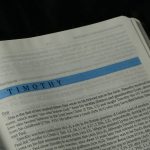If there be really a hell of such dreadful and never-ending torments, as is generally supposed, of which multitudes are in great danger—and into which the greater part of men in Christian countries do actually from generation to generation fall, for want of a sense of its terribleness, and so for want of taking due care to avoid it—then why is it not proper for those who have the care of souls to take great pains to make men sensible of it? Why should they not be told as much of the truth as can be?
Jonathan Edwards, The Distinguishing Marks of a Work of the Spirit of God
Seven Years of Famine, and a Vision
In 1991, at the height of the church growth movement, I moved to New England to plant a church. That spring I shared my vision at a church planting training event. I described a summer day some 250 years earlier in Enfield, Connecticut, when, in the midst of the Great Awakening, Jonathan Edwards had preached his now-famous sermon “Sinners in the Hands of an Angry God,” and “there was a great moaning and crying out throughout the whole house. What shall I do to be saved? Oh, I am going to Hell!”[1]
That was what I longed to see—the powerful movement of God’s Spirit through the preaching of “as much of the truth as can be.” Edwards saw this movement also when he preached his less famous but, by his own account, most effective sermon, “The Justice of God in the Damnation of Sinners.”[2] Here he reasons from man’s infinite sinfulness and God’s absolute sovereignty that “it is just with God eternally to cast off and destroy sinners.” He concludes his address to the unconverted with a caution against discouragement, for “it would also be just in God to save you, in and through Christ, who has made complete satisfaction for all sin. . . . You need not be at all discouraged from seeking mercy, for there is enough in Christ.” Like Edwards I desired to see men made sensible of their perilous state before a holy God turning to Christ, that they might know God’s mercy.
That was the vision when, in 1992, I launched Christ Memorial Church in Vermont. For seven years I preached through books like Habakkuk and Mark, Exodus and 1 Corinthians, pleading with sinners to flee to Christ. But those seven years were years of famine. And that famine might have starved all hope of a harvest were it not for a glimpse of white in the field that came through Bob and Kathy.[3]
‘You’re Going to Hell, Merry Christmas!’
Bob and Kathy were quintessential New Englanders—nominally Catholic, virtually unchurched, and decidedly postmodern. Kathy came to Christ Memorial in the fall of 1996 through our ministry to moms and was soon converted. Bob watched as his wife began to change and his family headed to church without him. When Kathy invited him to a Christmas Eve candlelight service, he was ready to say yes.
That evening I preached a common Christmas text, Simeon’s Song from Luke 2. Bob would dub that sermon, “You’re Going to Hell, Merry Christmas!” As he later recalled, “It wasn’t the service I thought it was going to be. All I remember was hearing that I was wretched and vile and deserved to go to hell. It felt like Wes was poking me in the chest saying, ‘This is you, buddy,’ and I was angry.” But Bob returned the following Sunday, and the next. “It was probably two or three sermons later that I started shaking my head thinking, yes, that is me. God had started working in my life.” By Easter God had finished that work unto salvation. The sinfulness of sin, the wrath of God, and the justice of that wrath against sinners were Bob’s introduction to mercy: Christ’s wrath-absorbing, sin-removing, justice-satisfying work on the cross. By this message Bob was roundly and soundly converted.
Men Made Sensible
For more than a decade Bob has headed up building and grounds for Christ Memorial and for the NETS Institute for Church Planting. He’s helped teams in Wales, Canada, and New England in renovation projects related to our church planting efforts, most recently converting a run-down gym into a beautiful five-bedroom parsonage for Redeemer Fellowship Church in Boston. Bob is laying down his life to help plant gospel-driven churches in New England and beyond, churches with preachers who take great pains to make souls sensible of the danger, that they might fear the One who has the authority to cast into hell and, by God’s grace, have those fears relieved.
Bob and Kathy’s conversions were a harbinger of great gospel things to come, things we would not have believed even if told beforehand. The famine was about to end. The fields would soon be white for harvest. The Lord of the harvest was preparing to transform our church through a relentless display of gospel power whose effects continue to this day. But more on that next time.
[1] From the diary of Stephen Williams, cited in George M. Marsden, Jonathan Edwards: A Life (Yale University Press: New Haven, 2003), 220. [Punctuation added.]
[2] “According to the estimate of Mr. Edwards, it was far the most powerful and effectual of his discourses; and we scarcely know of any other sermon which has been favoured with equal success.” Sereno Dwight, “An Essay on the Genius and Writings of Jonathan Edwards,” from The Works of Jonathan Edwards, Vol. I.
[3] This story is shared with permission.




































